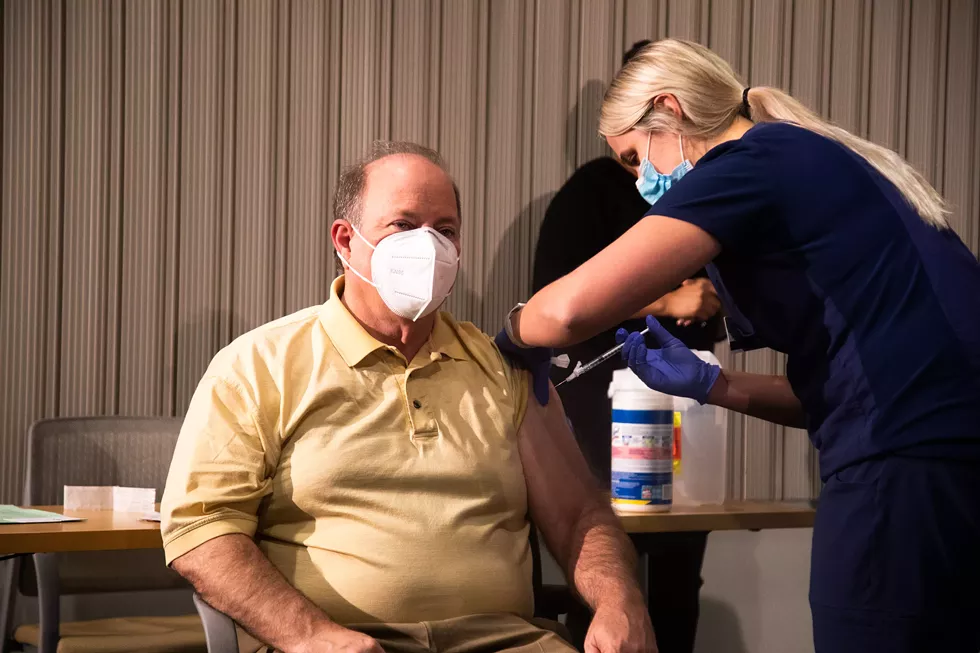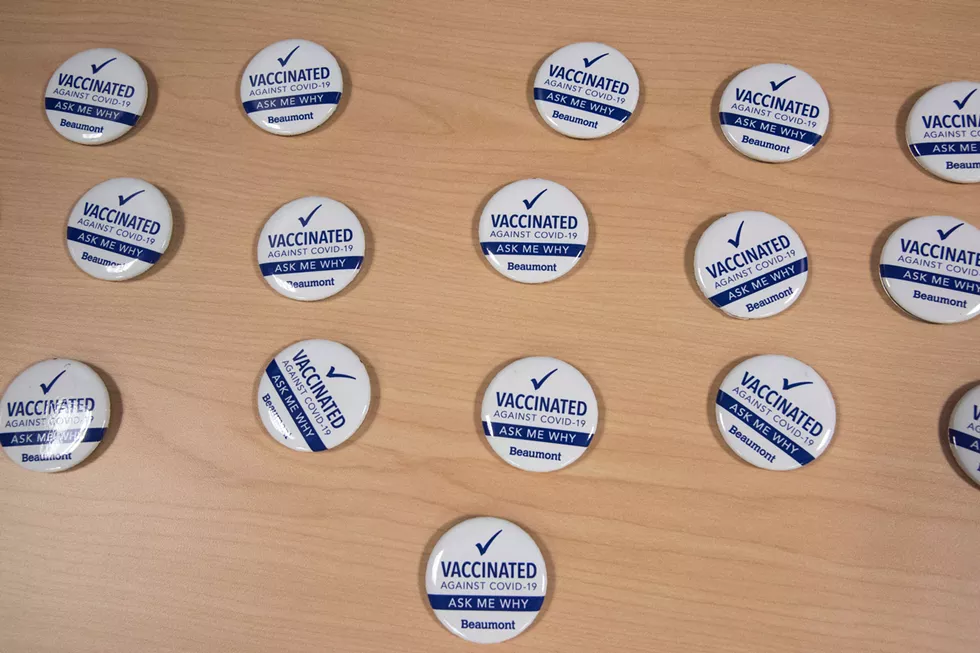
When Zack Taylor heard about the coronavirus vaccine coming to Michigan, the 22-year-old Detroit hip-hop artist responded with an indifferent shrug.
COVID-19 claimed the life of his aunt and infected more friends, neighbors, and loved ones than he can remember. He rarely leaves his house, but when he does, he always wears a mask and practices social distancing.
While the vaccine might seema like a no-brainer for someone so impacted by the virus — Taylor hasn't been able to perform due to the closure of music venues since March — he has reasons to be hesitant. As a Black man, he grew up hearing very real stories about cruel and unethical medical experiments on African Americans, which have made him distrustful of the federal government and medical community.
"There's something shady about the vaccine," Taylor tells Metro Times. "I don't know what it is, but I'm not convinced it's safe."
His skepticism is rooted in history. Medical schools used the bodies of enslaved Black people for anatomy dissections. Black women were sterilized and used for gynecological research. And then there was the Tuskegee syphilis study, a secret experiment conducted by the U.S. Public Health Service to analyze how the deadly venereal disease progressed. Hundreds of Black men were recruited between 1932–1972 and never told they had syphilis, depriving them of life-saving treatment.
"We can't have a conversation about whether to take a vaccine without acknowledging the history of racism that we have had in the health care system," Detroit Mayor Mike Duggan said at a recent news conference. "The Tuskegee experiment wasn't done by some private lab. It was conducted by the U.S. Public Health Service and the CDC. It wasn't ancient history."
Reaching broad immunity
A little more than a year since the first COVID-19 cases were reported in Wuhan, China, where it swiftly spread to almost every corner of the globe, vaccines are finally here, offering hope that this pandemic could soon end. That very fact is a medical marvel: Typically, vaccines take between five and 10 years to develop. Similarities between the coronavirus that causes COVID-19 and previous outbreaks of SARS and MERS meant that scientists weren't starting from scratch, plus more new technology and unprecedented amounts of research funding resulted in the rapid arrival of the vaccines.
But skepticism of the vaccines goes beyond race. Less than half of Americans said they will definitely get the vaccine, and about a quarter said they will not, according to a recent survey from the Associated Press-NORC Center for Public Affairs Research.
As states continue to roll out the vaccines, health officials are worried that an insufficient number of people will get vaccinated to halt the virus. Anthony Fauci, the government's top infectious-disease doctor, and other public health officials estimate that between 80% and 85% of Americans must be vaccinated to reach herd immunity.
Without a widespread willingness of the populace to get vaccinated, the consequences could be disastrous: The pandemic won't end, leading to future surges, an overburdened healthcare system, a crippled economy, and needless deaths.
"We are concerned that if we don't get enough people vaccinated, we won't stop this virus from continuing to cause significant damage to our communities," Dr. Adnan Munkarah, executive vice president and chief clinical officer of Henry Ford Health System, tells Metro Times. "This is a big concern."
Clinical trials involving tens of thousands of participants strongly suggest that vaccines are effective and rarely cause severe reactions. The CDC reported 29 cases of severe allergic reactions to the vaccines as of last week. None of the reactions caused death.
The U.S. Food and Drug Administration gave emergency authorization to vaccines from Moderna and Pfizer/BioNTech in December, marking a significant turning point in a pandemic that has killed more than 13,000 Michigan residents and infected another 513,000.
Health officials said the vaccines have received enormous scrutiny, and the reactions to the shots are tracked regularly to ensure they're safe. Clinical trials have shown vaccines are 95% effective and have modest side effects, if any at all. Side effects include short-term fever, muscle soreness, cough, fatigue, and headaches.
"These vaccines are safe and have been evaluated by the top scientists in the country," Dr. Joneigh Khaldun, the state's chief medical executive, said at a recent news conference. "They've been studied in tens of thousands of people. There is a robust national monitoring system, more than exists for most medications, in fact. Any adverse reactions are immediately reported and tracked across the entire country."
Hesitant frontline workers
Despite the promising evidence, even some frontline workers are balking at vaccines, an early sign that broad immunity won't be easy to achieve. Their hesitation surprised health officials because frontline workers, which include nurses, doctors, firefighters, and police, are at the highest risk for COVID-19 infections and more likely than the general public to be familiar with scientific data backing the inoculations.
In a recent Kaiser Family Foundation survey, nearly a third of frontline workers nationwide indicated they were "vaccine hesitant," saying they "probably or definitely would not get a COVID-19 vaccine even if it were available for free and deemed safe by scientists."
More than a third of Wayne County's first responders have declined to get vaccinated, a county spokesman said.
At Henry Ford Health System, about 21% of its more than 30,000 employees have declined a vaccine, and another 19% have not responded to an invitation to get inoculated. More than 18,000 employees — or about 60% of the workforce — have either received a vaccine or are scheduled to get one.
None of the workers who received their first shot reported a severe reaction, the health system said last week.
At Beaumont Health, the state's largest hospital system, the vaccine acceptance rate is much higher. Of the 43,000 employees who were offered a vaccine, 800 declined, and several thousand have yet to respond, according to Dr. Jeffrey Fischgrund, chief of clinical care programs at Beaumont Health.
"We are going out of our way to find out why some people have not responded," Fischgrund tells Metro Times. "It's an area of big concern because we have been at the center of this pandemic since March. For a lot of us, the only way to get out of this is to get vaccinated."
Fischgrund says the hesitation among healthcare workers is perplexing.
"You work in a hospital and you see what's happening," Fischgrund says. "You either get the vaccine or you get COVID. It sounds harsh, but how else are we going to turn the corner?"
To increase confidence in the vaccines, Beaumont employees who receive shots are asked to wear a button that reads, "Vaccinated Against COVID-19. Ask me why."
"We ask those who have gotten vaccines to be vaccine ambassadors," Fischgrund says.

Michigan began administering the first vaccines to health care workers on Dec. 14. Since then, Michigan has lagged behind most states in administering vaccines. As of late last week, the state had the 11th lowest vaccination rate in the U.S., having inoculated about 152,000 residents — or about 1.5% of the state's population, according to the CDC's COVID Data Tracker.
By Jan. 8, Michigan had received more than 772,000 vaccines and was beginning to offer shots to people 65 years and older. In Detroit, the city transformed the TCF Center garage into a public vaccination site.
The state expects the vaccines to be available to the general public later in the year. To learn more about who is eligible and where to receive a vaccine, see Michigan.gov/COVIDVaccine.
Why the hesitancy?
There are numerous reasons people are skeptical of vaccines. According to surveys, the primary reasons are concerns about side effects, unease with fast-tracked inoculations, the belief in rampant conspiracy theories, and the distrust of Big Pharma and the government to ensure the shots are safe and effective.
African Americans are among the most hesitant to get vaccinated. A University of Michigan poll in October found that nearly two-thirds of Detroiters said they likely won't get a vaccine. Black residents were four times as likely as white residents to say they don't plan to roll up their sleeves, according to the poll.
Duggan said Tuskegee's legacy looms large and is a "despicable period of history" that should not be dismissed.
"This is something very much in the consciousness of many Detroters," Duggan said. "So when they see the CDC and the federal government saying they have a vaccine, there is a higher level of distrust than you would expect."
A lot is at stake. The coronavirus has disproportionately impacted African Americans. In Detroit, the coronavirus has killed nearly 1,700 residents and infected more than 25,000 others.
Generations of racist housing and economic practices have trapped many Black people in impoverished neighborhoods without adequate resources. In Detroit, where more than a third of its population is impoverished and many are uninsured or underinsured, residents are far more likely to have pre-existing health conditions like diabetes, asthma, high blood pressure, heart disease, and obesity. Age and pre-existing conditions are the primary factors in COVID-19 deaths.
“You work in a hospital and you see what’s happening. You either get the vaccine or you get COVID. It sounds harsh, but how else are we going to turn the corner?”
tweet this
Contagious diseases also tend to spread faster in lower-income areas because many people rely on public transit, live in close quarters, and have jobs without paid sick days. A disproportionate number of lower-income residents also work in the service industry, where employees are in close contact with the public.
Wright Lassiter, CEO of Henry Ford Health System, was born in Tuskegee, Alabama, and is African American. In late December, he joined other Black health officials and Duggan to get vaccinated at a televised news conference "to serve as an example for African Americans to let them know I am very confident in the safety and efficacy of this vaccine."
The on-camera vaccines are part of a campaign to build trust in the state's Black communities.
"We believe the vaccine campaign is critically important, a major step forward, and a significant milestone in fighting this pandemic," Lassiter said, urging residents to "trust the science."
Dr. Audrey Gregory, who is CEO of Detroit Medical Center and is also Black, received her first dose of the vaccine in mid-December and said she gets why Black residents are reluctant.
"I understand skepticism; I understand cynicism," Gregory said. "I know it takes a lot, and I know it takes courage. Particularly in our Black community, it takes getting over the reality of things that happened."
She added, "This is not imagined fear. This is not imagined skepticism. It's deeply rooted in reality."
The good news, Gregory said, is that scientists from around the country have access to the research and vaccine data to ensure the inoculations are safe and effective.
"Our federal government invited other scientists in, so this isn't just the FDA," Gregory said. "As a country and a community, this is one of those times that our collective common good is so much better when we do it together."
Misinformation spreads like a virus
One of the biggest impediments to achieving broad immunity is misinformation. Wild, baseless conspiracy theories and propaganda are flooding social media, fueling vaccine skepticism and undermining public health. The claims range from bogus suggestions that the vaccines cause impotence to falsehoods about a nefarious plot to reduce the population.
Even though the claims are often preposterous and easily debunked, they are still gaining traction.
A Yahoo/YouGov poll found that 44% of Republicans believe a far-fetched conspiracy theory that claims Bill Gates, the billionaire founder of Microsoft, is using vaccines to implant microchips in people to monitor their movements as part of a global surveillance plot.
Over the past year, the online anti-vaccination movement has grown by 25%, attracting more than 10 million new followers, according to the Center for Countering Digital Hate (CCDH), which tracks online misinformation.
"The global scientific consensus on vaccines is being undermined by a small but determined and sophisticated network of individuals and groups spreading misinformation online," said CCDH CEO Imran Ahmed in a report called The Anti-Vaxx Playbook. "They have improved their reach and sustainability through skillful exploitation of social media to proselytize and normalize their fringe beliefs."
The movement is predominantly white and Republican, and it tends to attract people who are dismissive of scientific authority. President Donald Trump has downplayed the virus since it reached the U.S., and the Republican Party has a history of rejecting science, from evolution to climate change.
To combat vaccine misinformation, social media platforms have instituted new policies to remove falsehoods that undermine public health efforts. Facebook, for example, announced in December that it's removing posts that push debunked claims about vaccines. In October, YouTube began banning content that "contradicts expert consensus from local health authorities or the World Health Organization."
But stopping the spread of misinformation on social media is difficult because of how quickly and often posts are shared. The platforms often rely on users to report misinformation. By the time the posts are identified and removed, they can rack up thousands of views, likes, and shares.
Fewer than one in 20 posts containing falsehoods end up being removed, according to the CCDH report.
The CCDH recommends that social media companies take more drastic measures to stem the flow of misinformation.
"Anything less than the dismantling of these individuals' profiles, pages and groups and permanent denial of service, now that they know what's happening, is willing acquiescence," Ahmed wrote.
In late December, a Wisconsin pharmacist and admitted conspiracy theorist told authorities he tried to sabotage hundreds of doses of the Moderna vaccine because he feared they would mutate people's DNA. Police arrested him for intentionally ruining enough doses to vaccinate more than 500 people.
Will optimism grow?
To gain the trust of different groups and persuade people to get shots, state and public health officials are embarking on a sweeping campaign to raise awareness about the safety and effectiveness of the vaccines.
Gov. Gretchen Whitmer created the bipartisan Protect Michigan Commission, which is tasked with educating Michigan residents about the vaccine.
"Right now, we are on the brink of great breakthroughs when it comes to an effective COVID-19 vaccine, and we must begin to educate Michiganders about how important it is that we all get vaccinated so we can eradicate this virus once and for all," Whitmer said at the time.
"This bipartisan group of leaders is uniquely equipped to help reinforce the importance of everyone getting vaccinated. Until we eliminate COVID-19 once and for all, we must continue to wear masks, practice safe social distancing, and wash hands frequently. Let's all continue to do our part."
As more people line up for a shot, public health officials believe others will follow.
"We know this is a challenge with all the politics around this public health crisis," Whitmer tells Metro Times. "We are doing outreach so communities know that these vaccines, which the FDA is approving, are safe and effective. It is an exciting moment."
Duggan said it's important for people to understand that a vaccine is far more preferable to fighting off an infection.
"The question is, do you want your body to build germ-fighting tools now when you're healthy or do you want to wait until you're on a ventilator struggling for life and then hope your body manufactures those tools?" Duggan said.
He added, "I believe positive messages will win out."
Stay on top of Detroit news and views. Sign up for our weekly issue newsletter delivered each Wednesday.






